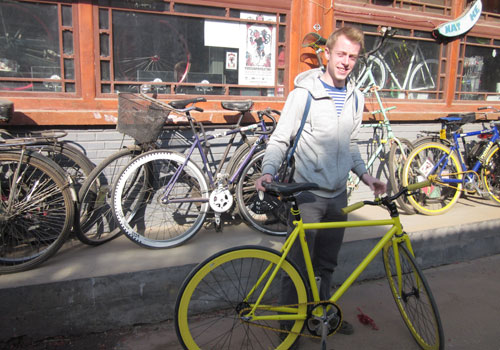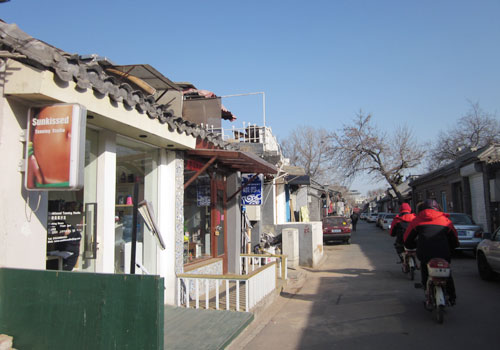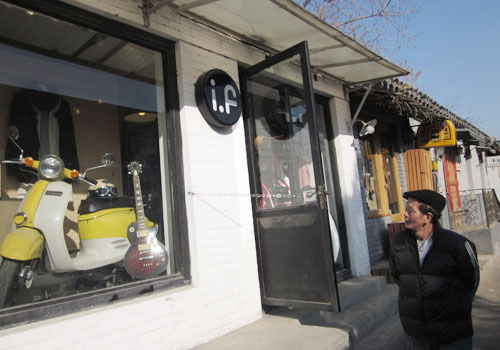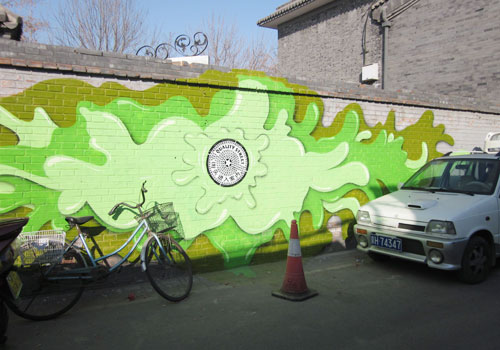Wudaoying: new life in an old Hutong
Hutong shopping streets offer a unique getaway from Beijing's plentiful, modern shopping malls. Until recently, Nanluoguxiang was the only legitimate location for shoppers seeking this unique atmosphere. Over the last year and a half, the Wudaoying Hutong near Beijing's Lama Temple has undergone a rapid transformation, establishing the alley as the city's newest trendy hangout.
|
 |
|
A part-time employee at Natooke fixed-gear bike shop, shows off his ride. [Photo:CRIENGLISH.com] |
Leading the way for the alleyway's new life is the Vineyard Café, which opened 2006. For a long time, the café was the only reason for most people to visit the alleyway, and many of the café owner's neighbors were skeptical of his vision. "They couldn't understand how a western restaurant would possibly work in a hutong like this in Beijing. Obviously, we chose this spot because it's a great hutong and because of its location, near the Confucius Temple, the Lama Temple and ease of access, compared to Houhai and Nanluoguxiang," Vineyard Cafe's owner, Will Yorke, explained. "Other people have since realized the quality of the street and moved in as well."
Business on the street blossomed during the latter part of 2009 and into 2010. Many long-time residents are now earning income by renting spare rooms; a 20 sqm space has been reported to rent for about 5,000 yuan per month.
|
 |
|
Many of the Wudaoying residents have renovated their hutong homes and rented their front rooms to businesses. [Photo:CRIENGLISH.com] |
The charming, renewed hutong spans the distance between Andingmen subway station and Yonghegong subway station. While much of Nanluoguxiang has been taken over by souvenir-style trinket shops, Wudaoying has a refreshing variety of businesses, including a tanning studio, clothing shops, home décor shops, specialty stores, restaurants and bars. Shopkeepers are engaging but not pushy, and many of the business owners can be found tending to their shops.
Mandela sells Buddhist paintings made by lamas in Tibet and Nepal, as well as incense and some jewelry. "I love Tibet and Tibetan culture," shop owner Jason Tu says when asked why he opened the shop. He is friendly and quick to explain the characteristics and stories behind each painting. After several shorter trips to Tibet, he embarked on a six-month biking adventure on the plateau. On these trips, he became friends with lamas who taught him Tibetan culture and art.
 |
|
The variety of shops and restaurants in Wudaoying Hutong has made this alleyway a trendy shopping destination for locals and foreigners. [Photo:CRIENGLISH.com] |
Anchoring the unique atmosphere of Wudaoying is Natooke, a shop specializing in custom-fixed gear bikes and juggling equipment. When owner Ines Brunn, opened the shop in 2008, she sought a hutong location. After searching Beiluoguxiang and the Gulou area, she settled on Wudaoying. Natooke is the only fixed gear bike shop in Beijing, opened to serve the needs of the growing crowd of bicycle enthusiasts in the city. "We had the group, but no shop," she says of her decision to launch a fixed gear bike shop. "It's really a niche market."
Aside from Mandela and Natooke, other specialty stores include Save As, which stocks vintage keepsakes and vinyl records. Argo, a Greek restaurant, and Saffron, which serves Spanish-inspired cuisine, stand out among the street's dessert cafes and Western eateries.
Shoppers can easily spend an afternoon exploring Wudaoying, and all that its unique, easy-going culture has to offer. Most of the shops are closed on Mondays, so visitors should plan trips accordingly.
 |
|
Street art adds to the easygoing, hipster feel of the alleyway. [Photo:CRIENGLISH.com] |
A "hutong" refers to an alleyway surrounded by traditional courtyard homes. Having once dominated Beijing, they are now facing the challenge of staying relevant in the modern era.
The Beijing municipal government has taken notice of the struggle, targeting the Wudaoying Hutong for special development and designating it as a pedestrian street. To help with redevelopment, the government offers subsidies for renovating traditional homes, and taken on the bill for renovating state-owned buildings on the street.
















